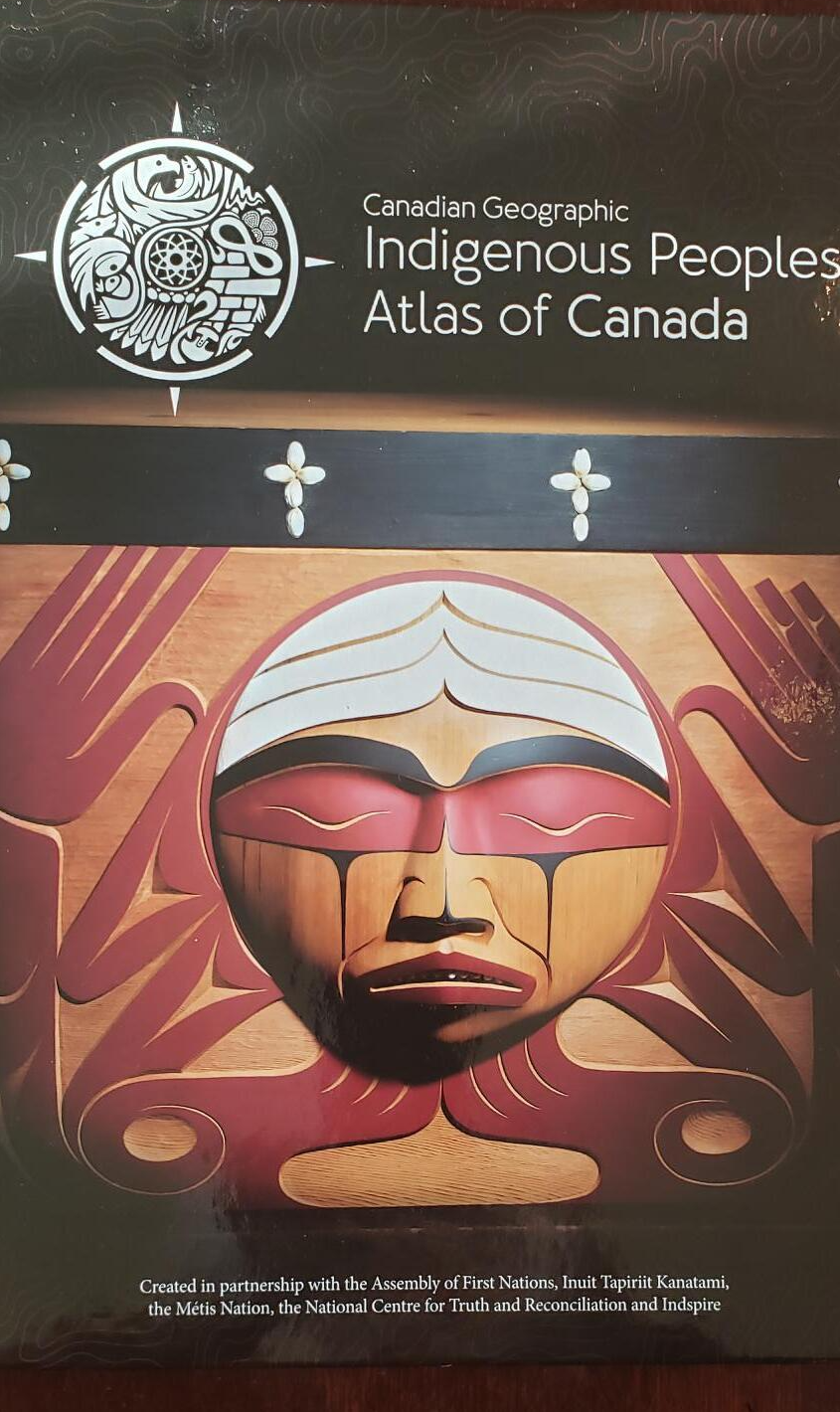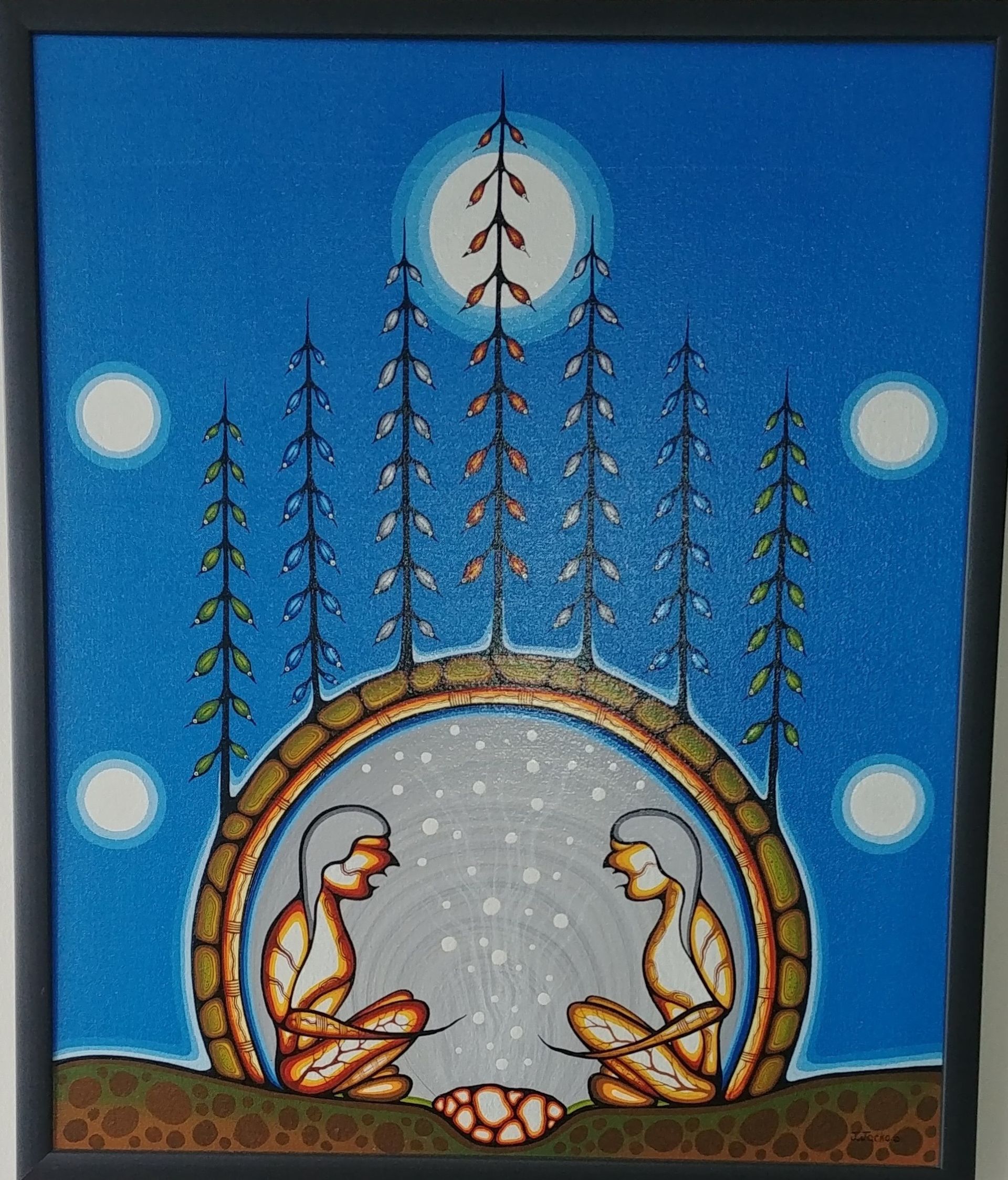Time for Action Is Now!

Cover image: Indigenous Peoples Atlas of Canada
Cooperative Effort between Canadian Geographic and Indigenous Peoples - see end of this blog post for more
four volumes in box set - a perfect gift
Beyond the 1% Indigenous Human Development Fund Proposal
It would give great satisfaction if it were possible to report that the 1% Fund for Indigenous Human Development based on the total of annual real estate sales across Canada had been welcomed and implemented by Indigenous organizations and the Federal government.
It would have meant that as much as $9 billion per year would flow into the coffers of an Indigenous governance body determining Indigenous human development priorities and funding.
It would have meant that the practice of “acknowledging Indigenous territories” was actually connected to substantial public funding, with action carried out by and for Indigenous Peoples transforming their educational and other human development systems.
It would have heartened the Indigenous-led Action Group, which imagined the proposal and encouraged the large number of people who affirmed the 1% Fund as an innovative and transformative funding initiative. Many had weighed the consequences and encouraged its implementation as a major “good faith” step toward justice and “reconciliation”.
Alas! The Fund is not to be. Speculating about the cause of its demise opens up a myriad of possibilities, but the bottom line is that the Action Group’s Proposal did not gain the traction nor the action needed for implementation.
Beyond the Action Group
The Action Group has dissolved and all its members, in their own ways, are pursuing the goals of a new relationship between Indigenous and Settler Peoples. We’re grateful for the people, groups, and organizations who studied, discussed, and embraced the Proposal.
As a Settler, I am profoundly grateful to have been a part of this indigenous-led Group. Our conversations pointed to ways and means of working toward a two-row wampum vision of Canadian society.
In particular, I am grateful, but ashamed, to have learned so much about how poorly Canada has met its human obligations, has disdained legal imperatives, and has failed its treaty and constitutional responsibilities to Indigenous Peoples – particularly in the last 150 years.
By the profound culturally-based racist policies, blinkered theologies, arrogant attitudes, illegal actions of governments, and more, the “honour of the Crown” has been and continues to be impugned. Worse, Indigenous Peoples have experienced centuries of subjugation, dependency, and impoverishment. The hugely unjust gaps between the economic, educational, and social worlds of Colonizing Settlers and Indigenous Peoples have generated valid calls for repentance by the dominant society, and will continue to generate storm clouds over Canada.
The Big Solution
Core Action required: get rid of the vile Indian Act of 1876 - its framework and policies of subjugation. Surely by the 150th anniversary of this evil piece of legislation it could be well underway!? Respectfully negotiate a new way of sharing the land. Take seriously the legal judgements of the Supreme Court of Canada. Honour the many all-too dishonoured Treaties: e.g. learn from the Robinson Huron Litigation process today seeking augmentation of annuities income since 1850 Treaty was first agreed! (https://issuu.com/waawiindamaagewin/docs/rhw_treatytimes_issue3_2022).
We need a ground swell of Canadians calling for justice and real “reconciliation.” National civil society movements, political parties with courageous leaders, educational institutions, all faith communities, and especially Christian churches need to come together on this key issue. All urgently need to call for and seek justice for Indigenous Peoples. They need to be calling the whole society to take seriously what the Royal Commission on Aboriginal Peoples already proposed in 1996. ( Jean Chretien sought to take seriously the recommendation in his Settler-only way, by proposing to erase the Indian Act and proclaim that assimilation was the way to solve Canada’s Indigenous problem!!)
Not so, insisted wise and grounded Indigenous leaders; not so, Indigenous communities drummed! They persisted in being, in belonging, and in resisting genocide by courageous witness, costly litigation, and dramatic actions. A wholly new dispensation must be negotiated. Just like the flawed Treaties had been negotiated between sovereign nations and self-determining peoples, so respectful negotiations are now required for “reconciliation” to be more than yet another Settler society imposed “solution.”
All Canadians need to recognize that the curse of imperial colonizing is a disease that is global and needs eradication. Russia’s current war on Ukraine is a particularly gruesome and bloody examples of this sickness inhabiting the souls of arrogant humans. The disease is nurtured by greed, by hungering for power, by delusions of grandeur, and with an wicked mindlessness about the disease's impact on others in God’s one human family, and blind to suffering of the Earth.
We see the disease in Guatemala and Colombia, where corporate interests on behalf of shareholders conspire with governments to deprive Indigenous people of their farmlands and waters. What is the lot of Uighurs and Rohingya peoples other than colonizing, depriving, banishing? The Bolsonaros of the world want to build economic empires at any costs. Palestinians lose their homes, their olive trees, and are subjugated in illegally occupied territories by the state of Israel and its “defense” forces. Just a few of the far too many stories to be told about humans dominating "others".
The United Nations, with its many former colonized nations, knows only too well this virus afflicting the human species. It issued the UN Declaration on the Rights of Indigenous Peoples with it 46 Articles because neither religious values nor human consciences were capable of convincing far too many governments to treat Indigenous Peoples justly. But now, the international bench marks are printed, and policies and practices can be evaluated, judged. In Canada, the Supreme Court has issued judgements legally requiring more just policies and action – but the Crown's governments continue to find ways to thwart full implementation. How long, oh God?
The Step by Step Journey
So, apart from the "big solution" - the replacement of the Indian Act, there remains the step-by-step journey that each Settler Canadian is called to walk. Individuals, families, groups of concerned citizens, Settlers can contribute to the diminishing this this global disease. But steps must not be confused with arrivals!
Today, we can welcome the appointment of Justice Michelle O’bonsawin to the top Court. We can also celebrate that a BC court takes seriously the rights of courageous Wet’suwet’en demonstrators at Fairy Creek to protest peacefully the devastation accompanying the creation of TMX pipeline though ancestral lands. The court rebuked the RCMP for its brutal attacks and violence as having no place in the Canadian justice system. (Cf. https://mailchi.mp/nationalobserver.com/fallout-at-the-fairy-creek-blockade?e=142990f8e0 ) At the same time, we can recognize how much reform is still needed for Indigenous People to experience justice in the legal and correctional systems.
What follows are a few suggestions among countless possibilities for Settler initiative and for sharing the wealth Settlers have gained from Indigenous lands and resources . As well, I point to several written resources that might open more windows and doors for Settlers to help transform governments and Settler-dominated society into a willing partnership. The vision being pursued remains friendship and a justice-based “two-row wampum” Canada.
Four Ideas for $$$ sharing:
1. Indspire Foundation (www.Indspire.ca) offers awards to Indigenous students. Wikipedia says: “Indspire, formerly known as the National Aboriginal Achievement Foundation, is a national Indigenous registered charity that invests in the education of Indigenous people for the long-term benefit of these individuals, their families and communities, and Canada.” Our household contributes to the Foundation regularly.
2. The Nii’kinaagamaa Foundation promoted in a CBC-radio interview (16 November 2022) with Patty Krawec, author of “Call to Unforgetting the Past and Re-imagining Our Future” is worth exploring. The idea suggested is to pay rent for the Indigenous territory we occupy. “One thing that those who are not Indigenous to this place can do is pay rent. Through one time or monthly donations you can help to support Indigenous organizers who are building up their communities while confronting injustice. You can provide material support to Indigenous people who are in need.” (www.PayYourRent.ca)
3. ReciprocityConnects.ca & ReciprocityTrusts.ca is a Victoria BC based movement seeking to “decolonize” properties owned and/or occupied by Settlers. Through voluntary assessments they strengthen local Indigenous communities through financial contributions.
4. Healing Fund of The United Church of Canada is focused more toward United Church donors, but open to receiving contributions from anyone. The Fund responds to Indigenous requests whether church-based or not. The Fund has been active since the 1990s - post UCC apology of 1986, responding to applications for program support from diverse Indigenous groups. Learn more at:
https://united-church.ca/community-and-faith/being-community/indigenous-ministries/healing-fund.
Five Published Resources to Consider
1. True Reconciliation – How to Be A Force for Change. Jody Wilson-Raybould. Just released.
Says the promo: “For Wilson-Raybould, what individuals and organizations need to do to advance true reconciliation is self-evident, accessible, and achievable. True Reconciliation is broken down into three core practices—Learn, Understand, and Act—that can be applied by individuals, communities, organizations, and governments.”
2. First Nations 101 – Tons of Stuff You Need to Know, 2nd edition. Linda Gray. Vancouver, Adaawx Publishing, 2022. ISBN 978 0986 9640 1 5. $20. Cf. www.firstnations101.com. In 328 pages, Linda Gray shares an immense amount of information about the Indigenous experience. Eminently readable, its seven sections cover: Indigenous Diversity, Who We Aspire to Be Again, Externally-Imposed Interventions, Fallout from Forced Interventions, Toward Health & Wellness, How to Become an Ally, The Way Forward: Paddling Together. About 100 or so 2-to-5-page "chapters" each with a list of where you can find out more – a bonanza of information.
3. Understanding First Nations: The Legacy of Canadian Colonialism. Dr. Ed Whitcomb. Ottawa, From Sea to Sea Enterprises, 2019. ISBN 978 0986 596 742. Cf. [email protected]. If you’re looking for modest-sized book to give you informed background to the whole issues of Indigenous and Settler relations, then Whitcomb’s work is helpful. Sympathetic to the Indigenous case for justice, he dispels ignorance and demonstrates how Canadian society as a whole – Settler and Indigenous Peoples – can stand together to claim a better future for all.
4. Indigenous Peoples Atlas of Canada: Royal Canadian Geographic Society in partnership with the Assembly of First Nation, Inuit Tapiriit Kanatami, the Metis Nation, the National Centre for Truth and Reconciliation, and Indspire. Ottawa, 2018. ISBN 978 0 986 7516 5 3. Boxed set of four volumes: 1. Maps, Introduction, Glossary; 2. First Nations; 3. Metis; 4. Inuit. This is a beautiful bundle – could easily be deemed to be a coffee table gift volume….until you open it up and you realize it is jam packed with vital information and thoughtful reflections, and helpful visuals revealing Canada’s Indigenous reality. I received this as a very welcome birthday gift mid-summer. At this time of year, it is easy to commend it heartily as a marvelous gift for anyone who understands how important this topic is for the present and future of Canada. Encyclopedic in its scope, the set is validated by the fact that it is the product of a partnership that fully engaged Indigenous Peoples. (https://rcgs.org/)
5. The Globe and Mail Saturday edition. To my appreciative surprise, the G&M has been publishing much that supports the “reconciliation” process between Canada’s Indigenous and Colonial Settler Peoples. Whether it is an op ed piece by Jody Wilson-Raybould about her new book, or a retrospective on the Indigenous struggle for justice as in the Oka standoff, Kamloops Residential School atrocities, the Wet’suwet’en land defense, the challenge to include section 35 in the Constitution of 1982, the G&M has contributed frequently and substantially to the credibility of the Indigenous struggle for justice. I hope its editors continue to contribute substantially to the long journey.

